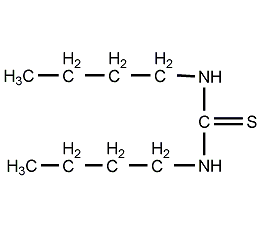
Structural formula
| Business number | 02Z0 |
|---|---|
| Molecular formula | C9H20N2S |
| Molecular weight | 188.33 |
| label |
N,N’-Dibutylthiourea, 1,3-Dibutylthiourea, Dibutylthiourea, N, N’-dibutyl thiourea, 1,3 – dibutyl thiourea, 2-butyl-thiourea, vulcanization accelerator |
Numbering system
CAS number:109-46-6
MDL number:MFCD00004629
EINECS number:203-674-6
RTECS number:YS8400000
BRN number:507434
PubChem number:24893910
Physical property data
1. Properties: White to light yellow crystalline powder.
2. Relative density (g/mL, 20℃): 1.061
3. Relative vapor density (g/mL, air=1): Undetermined
4. Melting point (ºC): 63-65
5. Boiling point (ºC, normal pressure): Undetermined
6. Boiling point (ºC, 14mmHg): 122-128
7. Refractive index (D20): 1.4410
8. Flash point (ºC): Undetermined
7. p>
9. Specific rotation (ºC): Undetermined
10. Autoignition point or ignition temperature (ºC): Undetermined
11. Vapor pressure (mmHg , 20ºC): Undetermined
12. Saturated vapor pressure (kPa, ℃): Undetermined
13. Heat of combustion (KJ/mol): Undetermined
14. Critical temperature (ºC): Undetermined
15. Critical pressure (KPa): Undetermined
16. Log value of oil-water (octanol/water) partition coefficient : Undetermined
17. Explosion upper limit (%, V/V): Undetermined
18. Explosion lower limit (%, V/V): Undetermined
19. Solubility: Insoluble in water, hardly soluble in ether, soluble in alcohol.
Toxicological data
1. Acute toxicity: Rat oral LD50: 350mg/kg; Mouse abdominal LD50: 800mg/kg;
2. Reproductive toxicity
Rat oral TDLo: 225mg/kg (6-20 days after conception in female rats); Oral TDLo in rats: 375mg/kg (6-20 days after conception in female rats)
Ecological data
This substance is slightly hazardous to water.
Molecular structure data
1. Molar refractive index: 58.22
2. Molar volume (cm3/mol): 199.7
3. Isotonic specific volume (90.2K ): 492.6
4. Surface tension (dyne/cm): 37.0
5. Dielectric constant:
6. Dipole moment (10-24cm3):
7.Polarizability: 23.08
Compute chemical data
1. Reference value for hydrophobic parameter calculation (XlogP): None
2. Number of hydrogen bond donors: 2
3. Number of hydrogen bond acceptors: 1
4. Number of rotatable chemical bonds: 6
5. Number of tautomers: 2
6. Topological molecule polar surface area 56.2
7. Number of heavy atoms: 12
8. Surface charge: 0
9. Complexity: 103
10. Number of isotope atoms: 0
11. Determine the number of atomic stereocenters: 0
12. Uncertain number of atomic stereocenters: 0
13. Determine the number of chemical bond stereocenters: 0
14. Number of uncertain chemical bond stereocenters: 0
15. Number of covalent bond units: 1
Properties and stability
Avoid contact with strong oxidizing agents. Soluble in ethanol, insoluble in ether, insoluble in water. This product is non-toxic.
Storage method
Stored in a cool, ventilated warehouse. Keep away from fire and heat sources. should be kept away from oxidizer, do not store together. Equipped with the appropriate variety and quantity of fire equipment. The storage area should be equipped with emergency release equipment and suitable containment materials.
Synthesis method
1. Prepared from n-butylamine and sulfuryl chloride as raw materials.

2. Butyldithio Butylammonium carbamate decomposes when heated to 96 to 100°C, releasing hydrogen sulfide gas to generate dibutyl thiourea. After separation, washing with 70-80℃ hot water, cooling and crystallization, crushing, and drying at 30-40℃, the finished product is obtained.
3. Use n-butylamine and carbon disulfide as raw materials, react at 30°C, and then heat and decompose at 100°C.

Purpose
Vulcanization accelerator for natural rubber, butyl rubber, styrene-butadiene rubber, and chloroprene rubber, especially for chloroprene rubber, which can promote rapid vulcanization at low temperatures; also used as natural rubber, chloroprene rubber, and nitrile rubber. Anti-ozonant for rubber and styrene-butadiene rubber. Products using this product have good physical properties, no pollution, no discoloration, and are compatible with wires, industrial products and sponge products.

 微信扫一扫打赏
微信扫一扫打赏

